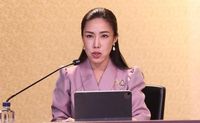On March 27, 2025, significant developments emerged from the Thai government as various ministries presented proposals aimed at enhancing regulations and addressing pressing issues in the digital economy and entertainment sectors. The cabinet meeting, which was the first following a recent no-confidence debate against Prime Minister Srettha Thavisin, marked a transition from a relaxed atmosphere to a more serious discussion on national security and regulatory measures.
Mr. Prasit Chanthararuangthong, the Minister of Digital Economy and Society (DES), revealed ongoing efforts to combat cyber threats. He confirmed that by the end of March 2025, a draft of the Royal Decree aimed at preventing and suppressing cybercrime will be completed. This decree is expected to outline the responsibilities of financial institutions, telecommunications companies, and digital platforms in safeguarding against cyber threats.
"This Royal Decree will establish a framework for collaboration among financial institutions, telecommunications companies, and digital platforms to ensure accountability in the face of rising cyber threats," Mr. Prasit stated. He noted that the decree would be published in the Royal Gazette by early April 2025, allowing it to take effect immediately.
During the meeting, Mr. Prasit emphasized the need for these entities to understand their roles once the decree is enacted. He mentioned that discussions have already taken place with mobile operators and financial institutions to clarify their responsibilities. However, he acknowledged that some details remain unresolved, particularly regarding the requirements for banks in opening accounts. "We need to ensure that account openings are not too lax, and institutions must verify the legitimacy of applicants to prevent fraud," he explained.
In addition to cybercrime legislation, the cabinet also discussed measures to enhance investor confidence in the stock market. Klang Senoh, a key figure in the Ministry of Finance, proposed amendments to the Royal Decree governing the Office of the Council of State. This amendment aims to empower the Securities and Exchange Commission (SEC) to conduct criminal investigations and impose penalties on those engaging in stock market manipulation.
"These changes are crucial for restoring trust in our financial markets," Klang stated. He highlighted that the SEC's enhanced authority would enable more thorough examinations of market activities, fostering a healthier investment environment.
Furthermore, the cabinet examined a proposal for a comprehensive entertainment business law, which is designed to regulate the entertainment industry more effectively. This draft law, which has undergone revisions by the Council of State, includes provisions for licensing, operational guidelines, and penalties for non-compliance. The Ministry of Finance reported that approximately 71,000 people participated in public consultations regarding this legislation, with 80% expressing support.
"The feedback we received indicates a strong public interest in ensuring that the entertainment industry operates fairly and transparently," Klang remarked. He noted that the proposed law would also address concerns regarding the influence of opaque business practices in the sector.
Moreover, the cabinet discussed the integration of technology into regulatory frameworks. Klang suggested that the amendments to the Royal Decree should include provisions for greater flexibility in utilizing technology, particularly in enhancing national security measures. This aligns with the DES's ongoing initiatives to leverage artificial intelligence (AI) in understanding and addressing cyber threats.
Mr. Prasit confirmed that the DES is already employing AI to analyze cyber threats and is considering expanding its use for threat detection. "If we are to use AI, it must be transparent, allowing for collaborative information sharing during investigations," he stated.
As part of the discussions, the cabinet also highlighted the importance of providing knowledge to digital entrepreneurs, particularly those in the gas station sector, regarding data usage and security. This initiative aims to bolster the digital economy while ensuring that businesses are equipped to handle emerging cyber threats.
In a related development, the cabinet approved amendments to safety standards for industrial products, including escalators and automatic walkways. A government spokesman announced that these new regulations will require compliance with updated safety standards to ensure public safety in public buildings.
"The aim is to enhance the safety of escalators and automatic walkways, which are increasingly installed in various public venues," the spokesman explained. The new regulations will come into effect 90 days after their publication in the Royal Gazette.
Additionally, the cabinet approved a resolution to amend the standards for electric irons to align with international safety standards, ensuring consumer protection and safety in the use of these products.
As these discussions unfold, the Thai government is poised to implement significant changes that will not only enhance regulatory frameworks but also address the pressing challenges posed by cyber threats and the need for transparency in the entertainment sector. The outcomes of these proposals will be closely monitored as the cabinet continues to deliberate on their implications for the nation.
As the cabinet meeting concluded, Prime Minister Srettha Thavisin expressed his commitment to fostering a regulatory environment that balances business growth with robust oversight, ensuring that Thailand remains competitive in an increasingly digital world.



